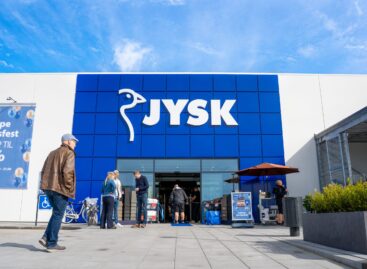K&H: carbon dioxide emissions do not decrease by themselves
In the absence of a sustainability strategy and concrete carbon footprint reduction plans, the majority of Hungarian companies are not yet prepared for the green transition, according to the research that forms the basis of the K&H sustainability index. The positive attitude of company managers towards sustainability is solid, they are increasingly informed about the requirements, but at the same time they are afraid of the obligations that fall on them.
For the fifth semester, K&H publishes its sustainability index and the comprehensive research that underpins it, which provides an accurate reflection of the sustainability-related efforts of Hungarian companies. The index currently stands at 38 points, which is a one-point drop compared to the previous period, but is the same as the value measured in the first half of 2022. “These indicators fluctuate slightly from semester to semester, it is perhaps not an exaggeration to assume that they depend to a large extent on the current financial situation and business prospects of the companies,” highlights Suba Levente, head of sustainability at K&H.
A company’s strategy speaks volumes – especially if there is none
The survey reveals that the proportion of companies that prepare a sustainability strategy has not changed: unchanged, only a small part of the companies (14 percent) put their plans in writing in this area. It is typical that the task of managing sustainability efforts at companies has fallen to a lower level than before.
There is no significant change in the proportion of companies preparing a regular sustainability report (12 percent) or planning one (9 percent). The proportion of companies that take sustainability aspects into account in their investment decisions to some extent (89 percent) did not change in half a year either, but compared to 38 percent in the previous half year, this is an important or priority issue for only 29 percent. Similarly, the trend has reversed in the selection of suppliers: instead of 37 percent, now only 31 percent consider sustainability aspects important when selecting suppliers.
Related news
Hungarians don’t replace their furniture – JYSK research reveals a conscious, long-term planning market
🎧 Hallgasd a cikket: Lejátszás Szünet Folytatás Leállítás Nyelv: Auto…
Read more >Fashion, drones and sustainability – the new face of agriculture at the AgriTech InnoExpo event
🎧 Hallgasd a cikket: Lejátszás Szünet Folytatás Leállítás Nyelv: Auto…
Read more >Related news
Hétéves növekedési stratégiát jelentett be az Auchan
🎧 Hallgasd a cikket: Lejátszás Szünet Folytatás Leállítás Nyelv: Auto…
Read more >








